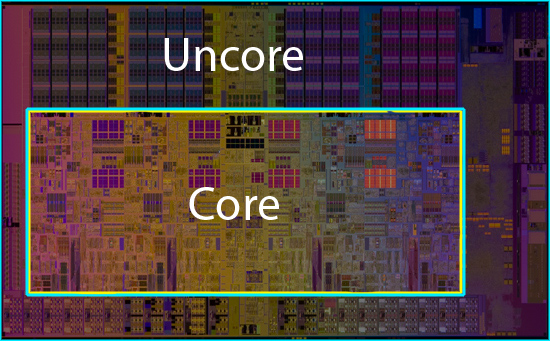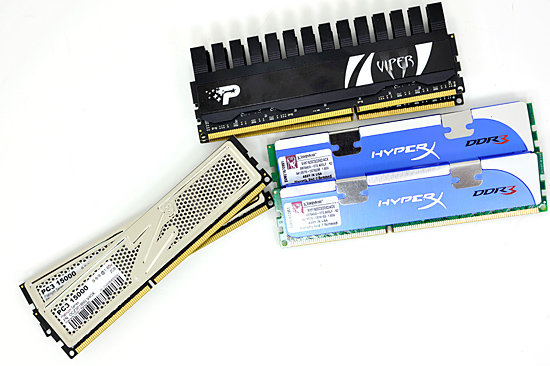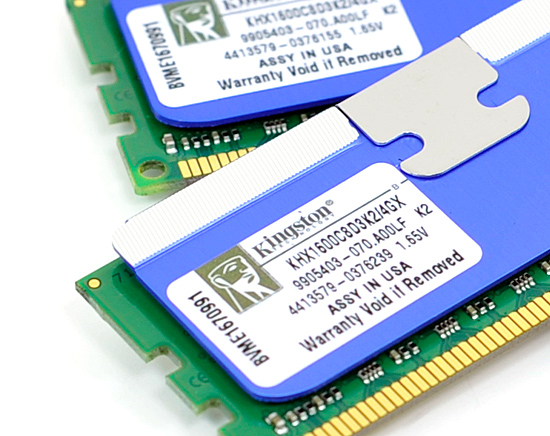Intel's Core i7 870 & i5 750, Lynnfield: Harder, Better, Faster Stronger
by Anand Lal Shimpi on September 8, 2009 12:00 AM EST- Posted in
- CPUs
Lynnfield's Un-Core: Faster Than Most Bloomfields
A few years ago I had a bet going with AMD's Ian McNaughton. We were at an AMD event where the Phenom architecture was first being introduced and he insisted that the L3 cache was part of the memory controller. This didn't make any sense to me so I disagreed. Minutes later a presentation slide went up on a projector talking about how the L3 cache and memory controller were on the same voltage plane; that's what he meant. Ian laughed a lot and to this day he holds it over my head.
The moral of the story is in Phenom and later in Nehalem, the processor is divided into two parts. Intel named them the core and the un-core. The "core" of these multi-core processors is made up of each individual processor core and its associated private caches (L1/L2). The "uncore" refers to everything else: PCIe controller, memory controller, DMI/QPI and the L3 cache.

The uncore isn't as critical for performance but is made up of a ton of transistors; roughly 400 million in the case of Lynnfield/Bloomfield (more if you count the PCIe controller). In order to save power, Intel uses slower transistors that have lower leakage for the un-core. As a result, the un-core can't clock up as high as the core and runs at a lower multiplier.
Take the Bloomfield Core i7 975 for example. The core runs at 25x BCLK (25 x 133MHz = 3.33GHz), but the un-core runs at 20x BCLK (20 x 133MHz = 2.66GHz). The rest of the chips, including Lynnfield, have slower un-cores:
| CPU | Socket | Core Clock | Un-Core Clock |
| Intel Core i7 975 Extreme | LGA-1366 | 3.33GHz | 2.66GHz |
| Intel Core i7 965 Extreme | LGA-1366 | 3.20GHz | 2.66GHz |
| Intel Core i7 950 | LGA-1366 | 3.06GHz | 2.13GHz |
| Intel Core i7 940 | LGA-1366 | 2.93GHz | 2.13GHz |
| Intel Core i7 920 | LGA-1366 | 2.66GHz | 2.13GHz |
| Intel Core i7 870 | LGA-1156 | 2.93GHz | 2.40GHz |
| Intel Core i7 860 | LGA-1156 | 2.80GHz | 2.40GHz |
| Intel Core i5 750 | LGA-1156 | 2.66GHz | 2.13GHz |
Here's another area where Lynnfield is better than the lower end Bloomfields: its uncore runs at 2.40GHz instead of 2.13GHz. The exception being the Core i5 750, its uncore is stuck at 2.13GHz as well. Once again, only the "Extreme" Bloomfields have a faster uncore.
Lynnfield's Memory Controller: Also Faster than Bloomfield
Intel only officially supports two memory speeds on Bloomfield: DDR3-800 and DDR3-1066. Obviously we're able to run it much faster than that, but this is what's officially validated and supported on the processors.
Lynnfield is a year newer and thus gets a tweaked memory controller. The result? Official DDR3-1333 support.

Three Lynnfield memory kits (left to right): OCZ, Patriot and Kingston
The same sort of rules apply to Lynnfield memory kits that we saw with Bloomfield. You don't want to go above 1.65V and thus all the kits we've seen run at 1.5V for the stock JEDEC speeds or 1.65V for the overclocked modules.

Like Bloomfield, 1.65V is the max we'll see on Lynnfield










343 Comments
View All Comments
yacoub - Tuesday, September 8, 2009 - link
lol, what a stupid comment. yes it's "cheating" to benchmark the processor the way it comes out of the box, which also happens to be how it is used in the real world environment.Voo - Tuesday, September 8, 2009 - link
Well there are many users who don't bother with overclocking so the tests aren't "illegal" or anything.But I tend to agree that most users who would be interested in buying an i7 920 or i7 860 would overclock it, so turbo mode wouldn't help at all, as we see with the OC results.
I'm curious if PCI-e on die is the only problem and if we'll see new chips who benefit from turbo mode even when overclocked. After all the principle behind turbo mode doesn't change if you overclock, does it?
james jwb - Tuesday, September 8, 2009 - link
IF that's true, i'm not at all happy with this review. But i'll wait for someone else to confirm this for obvious reasons... anand, confirm!Voo - Tuesday, September 8, 2009 - link
You read the text, didn't you? It was mentioned several times..james jwb - Tuesday, September 8, 2009 - link
i don't have time to read through all of it right now, was just flicking through and immeditaly thought to ask the question. I will read it fully later on, though.Hence why i asked the question. You say "it", as in which way, benches had turbo, benches didn't?
snakeoil - Tuesday, September 8, 2009 - link
yes again, turbo was on for all the benchmarks which is illegal and biased.maxxcool - Tuesday, September 8, 2009 - link
yes, the federal government says making a feature that makes your product better is legal.JarredWalton - Tuesday, September 8, 2009 - link
Illegal and biased? Yes, Intel is illegally making their CPUs run better at all workloads for normal users that don't overclock. Someone should arrest them! What would be biased is to test these CPUs in a fashion that artificially limits performance. Sure, it would be nice to see performance compared with and without Turbo enabled, but generally there's not enough time to run every potentially interesting test scenario.snakeoil - Tuesday, September 8, 2009 - link
there you go, finally you said it.all the benchmarks have at least 600 mhz over the processor's stock speed.
that is outrageous, then if you want to compare the result with phenom 2 you have to overclock phenom 2 at least 600 mhz over stock speed.
just to be fair
Anand Lal Shimpi - Tuesday, September 8, 2009 - link
The processor's stock speed is variable according to the workload it's running, that's what turbo mode does. AMD will enable similar functionality in 2011. This is the out-of-box performance of Lynnfield. Turbo mode is a feature of the processor as it has been since the mobile Penryn days (and more recently Nehalem). There's no reason to disable it as no end user would, unless you want to make Intel look worse for some reason.We also ran Turbo on vs. off numbers in the review: http://anandtech.com/cpuchipsets/showdoc.aspx?i=36...">http://anandtech.com/cpuchipsets/showdoc.aspx?i=36...
Take care,
Anand